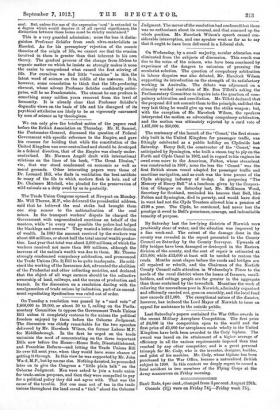On Tuesday a resolution was passed by a "card vote"
of 1,868,000 to 39,000, or about 50 to 1, calling on the Parlia- mentary Committee to oppose the Government Trade Unions Bill unless it completely restores to the unions the political freedom enjoyed by them before the Osborne Judgment. The discussion was chiefly remarkable for the two speeches delivered by Mr. Havelock Wilson, the former Labour M.P. for Middlesbrough. In the first he urged on the trade unionists the need of concentrating on the three important Bills now before the House—Home Rule, Disestablishment, and Franchise Reform—and letting the Trade Unions Bill lie over till next year, when they would have some chance of getting it through. In this view he was supported by Mr. John Ward, M.P., but by no one else. Nothing daunted, he proceeded later on to give the Congress a "little plain talk" on the Osborne Judgment. Men were asked to join a trade union for trade-union purposes, and then they were compelled to pay for a political policy they did not agree with. That was the cause of the trouble. Not one man out of ten in the trade unions throughout the land cared a " tink " about the Osborne Judgment. The mover of the resolution had confessed that there was no enthusiasm about its reversal, and that summed up the whole position. Mr. Havelock Wilson's speech caused con- siderable interruption, and one speaker went so far as to say that it ought to have been delivered in a Liberal club.






































 Previous page
Previous page